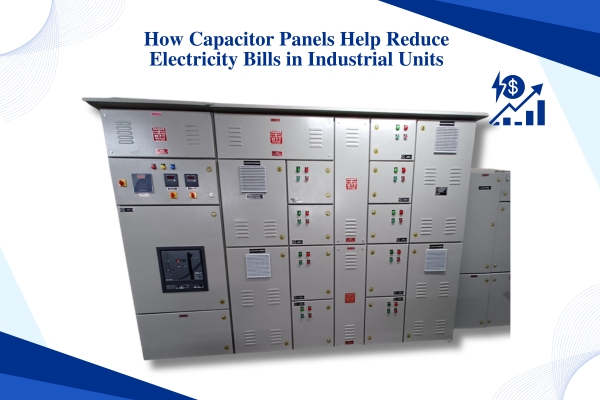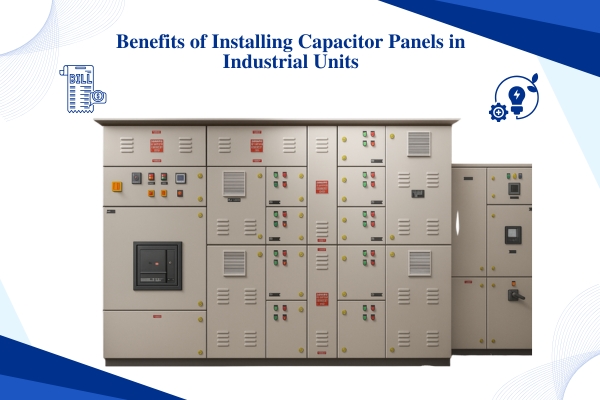How Capacitor Panels Help Reduce Electricity Bills in Industrial Units

Introduction
Industrial electricity costs in India are a significant overhead, particularly for units running heavy machinery. Many factory owners search for ways to optimise their power usage without affecting productivity. One practical and long-lasting solution is the use of Capacitor Panels. These panels not only support voltage stability but also help reduce electricity bills. This blog explains how they function, why they’re beneficial for industrial environments, and what you should know before installing one.
What Are Capacitor Panels and How Do They Work?
Capacitor panels are electrical devices designed to improve the power factor in industrial electrical systems. They work by storing and releasing electrical energy to compensate for reactive power, thus reducing the burden on the main power supply.
Key Functions of Capacitor Panels:
- Improve power factor efficiency
- Reduce demand charges from electricity providers
- Stabilise voltage in high-load environments
- Decrease the load on transformers and generators
Industries that use motors, compressors, and induction equipment typically suffer from poor power factor. This leads to unnecessary charges from power suppliers. A capacitor panel corrects this by balancing the reactive load.
Why Power Factor Matters in Industries
Power factor is a measure of how efficiently electrical power is used. A low power factor results in higher energy losses and increased electricity bills. Many power distribution companies impose penalties on units with poor power factor.
How Capacitor Panels Improve Power Factor:
- They counteract inductive loads
- Reduce energy waste
- Make the electrical system more efficient
- Lower maintenance needs by reducing strain on equipment
The cost savings from a well-maintained power factor can be substantial over time, especially for manufacturing units operating 24/7.
Benefits of Installing Capacitor Panels in Industrial Units

1. Lower Electricity Bills
Capacitor panels help decrease the amount of reactive power, which reduces the overall kilovolt-ampere (kVA) demand. This directly lowers the charges reflected in your monthly bill.
2. Avoid Penalty Charges
Electricity providers in India apply penalties for poor power factor performance. A capacitor panel keeps your unit in the safe zone and avoids these avoidable costs.
3. Improved Voltage Stability
Voltage fluctuations can harm sensitive machinery. Capacitor panels act as a buffer, absorbing sudden load changes and preventing voltage drops.
4. Extended Equipment Life
By maintaining a stable supply and reducing overloading, these panels can extend the operational life of motors and electrical devices.
5. Higher Energy Efficiency
A more efficient electrical system means less wasted energy. That translates to both environmental and cost benefits for industries under pressure to meet sustainability targets.
Where Capacitor Panels Make the Most Difference
Capacitor panels are especially useful in industries such as:
- Steel and aluminium plants
- Textile manufacturing
- Packaging and printing
- Automotive and engineering workshops
- Cement production facilities
These industries rely on heavy-duty machinery that demands a stable and efficient power supply.
Things to Consider Before Buying a Capacitor Panel
When selecting a capacitor panel, it is important to choose the right configuration for your operations.
Key Factors to Check:
- Load Type: Inductive, resistive, or mixed?
- Power Ratings: What is your total connected load in kW/kVA?
- Panel Type: Automatic or manual capacitor panel?
- Brand Reliability: Opt for a reputable Capacitor Panels Supplier with support availability.
- Installation & Maintenance: Availability of technical support post-installation.
Why Many Indian Industries Trust Dj Electro Controls
Dj Electro Controls is a well-known name among Capacitor Panels Supplier companies in India. They offer:
- High-quality automatic and manual capacitor panels
- Timely installation and after-sales service
- Customised solutions based on load analysis
The brand is preferred by factories that need robust and efficient solutions to keep electricity bills manageable without compromising operational efficiency.
Manual vs. Automatic Capacitor Panels
Manual Panels:
- Cost-effective
- Requires operator to switch capacitors based on load manually
- Suitable for small or stable load units
Automatic Panels:
- Monitors load in real-time
- Automatically adjusts the number of capacitors in use
- Ideal for dynamic load environments like foundries or processing plants
Automatic systems are often more reliable and preferred by modern industries that cannot afford downtime or human error.
Installation Tips for Best Results
To get the best out of a capacitor panel:
- Install as close to the load centre as possible
- Conduct a proper load and power factor analysis before choosing panel size
- Schedule regular inspections
- Train maintenance staff on basic troubleshooting
Even the best equipment fails if poorly installed. Always rely on certified professionals for setup and regular servicing.
Signs You May Need a Capacitor Panel
If you’re unsure whether your facility needs a capacitor panel, look out for:
- Regular penalty charges from the electricity board
- Equipment frequently overheating
- Unstable voltage or frequent tripping
- High kVA demand compared to actual kW usage
- Low energy efficiency despite upgrades
Getting a professional energy audit done can provide clarity and help plan investment in the right panel.
Long-Term Financial Impact of Using Capacitor Panels
While the upfront cost of capacitor panels varies based on size and features, the payback period is usually within 1–2 years. This is due to:
- Lowered energy bills
- Avoidance of fines
- Reduced downtime
- Less wear and tear on machinery
Industrial units looking to improve operational margins should consider this a worthwhile capital expense.
FAQ
Q1. What is the main function of a capacitor panel?
Answer: A capacitor panel improves the power factor of an industrial electrical system, helping reduce electricity bills and stabilise voltage.
Q2. Can capacitor panels help reduce power bills in factories?
Answer: Yes. By reducing reactive power usage and avoiding penalties from electricity suppliers, these panels help cut monthly costs.
Q3. Are capacitor panels suitable for all types of industries?
Answer: They are most suitable for industries with heavy inductive loads such as motors, compressors, and large machinery.
Q4. How do I choose the right capacitor panel for my factory?
Answer: You should consider load type, total kVA, panel automation, and vendor reliability. A professional audit can help you make an informed choice.
Q5. What is the difference between an automatic and a manual capacitor panel?
Answer: An automatic panel adjusts capacitors based on load in real time, whereas a manual panel requires manual adjustments by an operator.
Q6. Is maintenance required for capacitor panels?
Answer: Yes, regular inspections and cleaning are necessary to maintain performance and prevent breakdowns.
Q7. Can capacitor panels increase the life of my equipment?
Answer: Yes, by maintaining stable voltage and reducing load-related stress, they can extend equipment lifespan.
Q8. Who is a trusted supplier of capacitor panels in India?
Answer: Dj Electro Controls is a known and reliable capacitor panels supplier offering custom solutions and after-sales support.
Final Thoughts
For industrial units across India, managing power consumption is no longer optional it’s essential. Capacitor Panels offer an affordable and practical way to control electricity bills while improving system efficiency. With reliable suppliers like Dj Electro Controls, industries can find long-term solutions that work in real-world factory conditions. Whether you’re setting up a new plant or upgrading an existing one, investing in the right power factor correction system could make a measurable difference to your bottom line.

